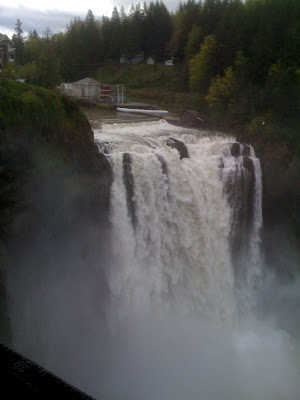
My past two quarters (crazy quarter system) of education have been filled to the gills with hazard mitigation material. I won't lie, the codes and regulations bore me to tears some days. However, there is a ton of new techniques and technologies that are being employed regularly that are quite applicable universally which are exciting if you're a geek like me. (stick with me here)
For example, new forms of permeable concrete have been developed to aid in storm runoff reduction and aquifer recharge. Also, crazy (sarcasm) landscapers and engineers have learned to create parks and other attractive landscapes to double as retention ponds (hello engineers and the planning staff that designed and approved the ugly hole at Lomas and Broadway!). Even bioswales (fancy landscape architecture jargon for ditches) are being installed in urban areas to create green space and act as a natural filter for storm runoff in streets.
These techniques really add up to create a healthier environment when you consider the current, archaic methods we have used for decades. For years we have attempted to engineer our civilizations out of harms way. We design our storm drainage system to a 100-year flood capacity (in ABQ) with the belief and hope that THE big storm will never hit. We even shoot rainwater runoff down pipes (unfiltered?) to the Rio Grande!
Well, in 2006, I believe, that 100-year event hit us quite hard. Twice. Some will say, "well, obviously, it's another example of global warming." Others, "That's God blaming us for allowing gay marriages." And others, "It's a fluke, who cares?"

This week, I have been studying hazard mitigation in the city of Snoqualmie, WA and today we were given a tour of the tiny city by the mayor and other officials who shared their knowledge regarding the city's preparation for the next big natural disaster.
Around 10am (after the caffeine had kicked in) I began to draw parallels between what I was hearing and what I had seen in Albuquerque when the floods hit a few years back. A visitor of China asked the question, "Why did the natives of this city settle in this flood-prone area in the first place?" I sorta chuckled when he asked this. But I didn't expect to hear the answer the gentleman received. Apparently, this area was not historically susceptible to flooding until the logging industry ran amok in the surrounding mountains. Interesting. Go on you say? The forests were ravaged to such an extreme that storm runoff had increased enough to make that drastic of a change to the environment.
So, the mice in my head began to run and I thought, "Hrm, could maybe, just maybe, the runoff situation in Albuquerque be the result of an increase in urbanized area?" Could we have built up the our roadways, sidewalks, and homes to the point where we have increased runoff so that our storm system actually reaches capacity with less effort?
I don't know about you but I'm suddenly intrigued with hazard mitigation and the ways in which we can use natural processes and nature-sensitive technologies (don't I sound like a hippy?) to cure the problems we have created through naive manipulation and false confidence?
The city's form of development has been so greatly affected by homogenization and generic growth to the point where our innovation has seemingly been forgotten. But alas, there are solutions. These solutions are so very simple, yet they require everyone to change the way they were taught to do things...and that's the harddest part.
3 comments:
hi, i'm moving there and have been googling pervious pavers and concretes and stuff all day long. if the sale goes thru on the house i want, i'm obsessed with run off and catchment and pervious....i've linked to you, i hope you don't mind. i jsoi from...abq rising, perhaps?
The major contributing factor for storms in the Washington town you visited is incredible! (Can)/ Is the town planning to reforest the mountains?
Welcome to ABQ, purejuice! I hope you find what you're looking for :)
Georgia; I'm not sure what they're doing to the forests in the area at this time as it wasn't mentioned in the tour.
Post a Comment